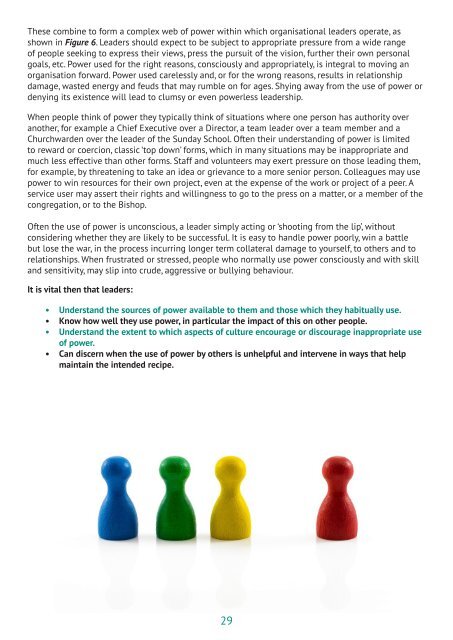Burnout in Churches and Christian Faith-Based Organisations
Burnout is a “syndrome of emotional exhaustion, depersonalization and reduced personal accomplishment that can occur among individuals who work with people in some capacity (Maslach 1996:193). This definition, whilst helpful, fails to convey the potentially life-shattering impact that burnout can have, as described in the words of ‘Peter’, a Christian leader who contributed to this guidance.
Burnout is a “syndrome of emotional exhaustion, depersonalization and reduced personal accomplishment that can occur among individuals who work with people in some capacity (Maslach 1996:193).
This definition, whilst helpful, fails to convey the potentially life-shattering impact that burnout can have, as described in the words of ‘Peter’, a Christian leader who contributed to this guidance.
Create successful ePaper yourself
Turn your PDF publications into a flip-book with our unique Google optimized e-Paper software.
These comb<strong>in</strong>e to form a complex web of power with<strong>in</strong> which organisational leaders operate, as<br />
shown <strong>in</strong> Figure 6. Leaders should expect to be subject to appropriate pressure from a wide range<br />
of people seek<strong>in</strong>g to express their views, press the pursuit of the vision, further their own personal<br />
goals, etc. Power used for the right reasons, consciously <strong>and</strong> appropriately, is <strong>in</strong>tegral to mov<strong>in</strong>g an<br />
organisation forward. Power used carelessly <strong>and</strong>, or for the wrong reasons, results <strong>in</strong> relationship<br />
damage, wasted energy <strong>and</strong> feuds that may rumble on for ages. Shy<strong>in</strong>g away from the use of power or<br />
deny<strong>in</strong>g its existence will lead to clumsy or even powerless leadership.<br />
When people th<strong>in</strong>k of power they typically th<strong>in</strong>k of situations where one person has authority over<br />
another, for example a Chief Executive over a Director, a team leader over a team member <strong>and</strong> a<br />
Churchwarden over the leader of the Sunday School. Often their underst<strong>and</strong><strong>in</strong>g of power is limited<br />
to reward or coercion, classic ‘top down’ forms, which <strong>in</strong> many situations may be <strong>in</strong>appropriate <strong>and</strong><br />
much less effective than other forms. Staff <strong>and</strong> volunteers may exert pressure on those lead<strong>in</strong>g them,<br />
for example, by threaten<strong>in</strong>g to take an idea or grievance to a more senior person. Colleagues may use<br />
power to w<strong>in</strong> resources for their own project, even at the expense of the work or project of a peer. A<br />
service user may assert their rights <strong>and</strong> will<strong>in</strong>gness to go to the press on a matter, or a member of the<br />
congregation, or to the Bishop.<br />
Often the use of power is unconscious, a leader simply act<strong>in</strong>g or ‘shoot<strong>in</strong>g from the lip’, without<br />
consider<strong>in</strong>g whether they are likely to be successful. It is easy to h<strong>and</strong>le power poorly, w<strong>in</strong> a battle<br />
but lose the war, <strong>in</strong> the process <strong>in</strong>curr<strong>in</strong>g longer term collateral damage to yourself, to others <strong>and</strong> to<br />
relationships. When frustrated or stressed, people who normally use power consciously <strong>and</strong> with skill<br />
<strong>and</strong> sensitivity, may slip <strong>in</strong>to crude, aggressive or bully<strong>in</strong>g behaviour.<br />
It is vital then that leaders:<br />
• Underst<strong>and</strong> the sources of power available to them <strong>and</strong> those which they habitually use.<br />
• Know how well they use power, <strong>in</strong> particular the impact of this on other people.<br />
• Underst<strong>and</strong> the extent to which aspects of culture encourage or discourage <strong>in</strong>appropriate use<br />
of power.<br />
• Can discern when the use of power by others is unhelpful <strong>and</strong> <strong>in</strong>tervene <strong>in</strong> ways that help<br />
ma<strong>in</strong>ta<strong>in</strong> the <strong>in</strong>tended recipe.<br />
29



